Eye Doctor for Kids in Deleware
At Simon Eye, exceptional eye care begins in early childhood.

What is Pediatric Optometry?
Simon Eye physicians provide eye care for life. That starts with our youngest patients – children. Yearly pediatric eye exams maintain good eye health and visual acuity. However, some patients may show signs of other visual dysfunctions even though they have 20/20 sight. That is where we have our leading pediatric optometrists working with children to educate and provide solutions for other visual issues.
What Do Pediatric Optometrists Test For?
An optometrist’s post-graduate education makes them uniquely qualified to diagnose vision problems and eye disease and prescribe prescription glasses and contacts, or in some cases, perform vision therapy. A pediatric optometrist can test for color vision deficiency, depth perception, visual acuity, and the health of your child’s eyes. They diagnose eye diseases and problems such as strabismus (crossed eyes or wandering eyes), amblyopia (lazy eye), double vision, and provide pre-op and post-op surgical care.
Signs of Vision Problems in Children
In children, vision changes can go undetected or can be debilitating. Because the early signs of many eye conditions can be mild, regular pediatric eye exams are the best way to catch problems early. Often children do not know that they do not see as well as they could, but these signs may mean that your child is having vision problems:
- An eye is turning in or out.
- Frequent headaches.
- Difficulty remembering things he or she has read.
- The short attention span for the ages.
- Difficulty recognizing colors, shapes, letters, numbers.
- Words going in and out of focus.
- Seeing double when they read.
- Words appearing to move on the page.
- Sitting close to the TV or holding a book close to his or her face.
- Squinting.
- Difficulty with hand-body coordination.
Pediatric Exams for Children in School
Pediatric eye exams are important for school aged children because learning can be compromised if vision or visual processing is affected.
- School-age children will have their eyes evaluated for the ability to focus, team, and track, since these skills are vital for success at school. Our optometrist will use eye drops to dilate the pupils, making it easier for the doctor to see the back of the eye. Children will watch a short video while the physician determines the power of the eye and assesses the need for glasses.
How do Pediatric Optometrists check a child’s vision if they are too young to talk?
Children do not have to read letters to get an accurate measure of the eyes and visual system. Stickers, flashlights, and light-up toys are used to engage the child during testing.
- Infants and toddlers can have their vision tested by simply looking at lines and pictures.
- Preschoolers match photographs or letters on a computerized chart.
What if My Child Needs Glasses?
If your child is prescribed eyeglasses, our certified opticians will explain lens options for children, how to wear and care for glasses and eyewear warranties.
At What Age Can My Child Wear Contact Lenses?
Based on maturity, children can begin wearing contact lenses between the ages of 10 and 12. Your child will receive contact lens handling and insertion and removal (I&R) training to make sure they are comfortable with contact lenses before leaving the office.
Expert Pediatric Eye Care in Delaware
Our Optometrists provide the expertise, education, and care that your child needs to succeed. Dr. Elizabeth Ide and Dr. Kristen Maus are specialized in pediatric conditions, which require additional types of therapy and work with each of the Simon Eye optometrist.
Related Services & Resources
Howard and the Amazing Eye Exam
Download a free eBook to get your child ready for the eye doctor!